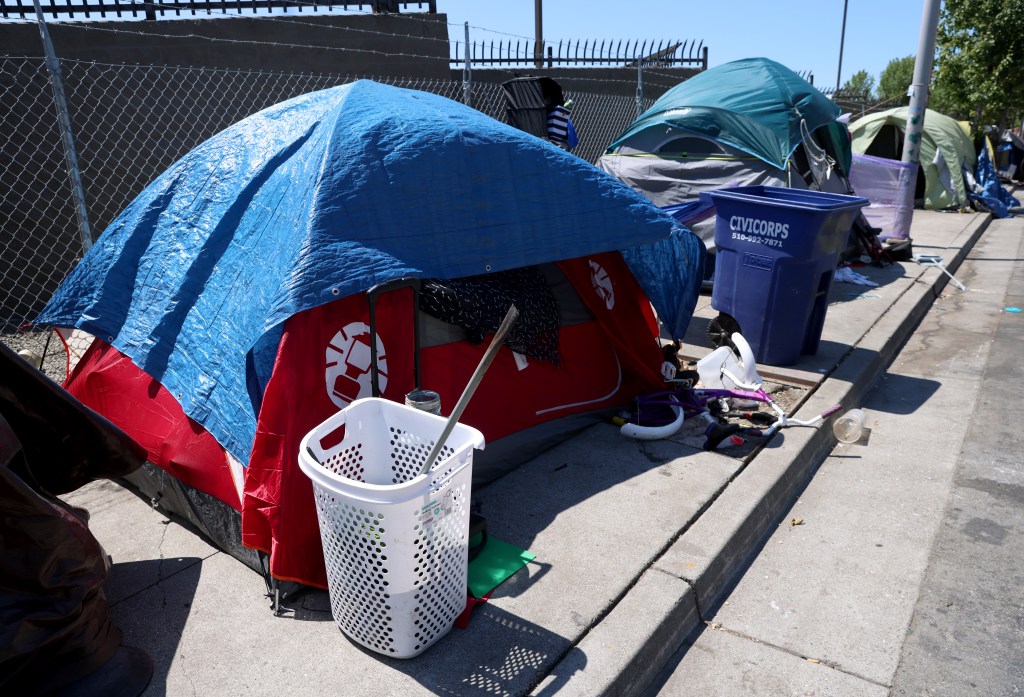“I’ve been looking for you.”
These were the words that haunted me during the more than two decades I spent living on the streets of Los Angeles, from 1977 to 1998. At the time, the city enforced robust anti-camping laws that kept homeless people out of sight but made it nearly impossible for friends, family and case workers to help me find permanent housing.
A June decision by the U.S. Supreme Court in the Grants Pass v. Johnson case signaled to local governments that they could enforce these laws without offering services or housing. A few weeks later, Gov. Gavin Newsom gave his own green light that they should move more aggressively — and that state agencies would as well — with an executive order.
My own experiences remind me that we’ve seen these laws before, and we know they don’t work. For me and scores of others, anti-camping rules didn’t solve our homelessness; they made it harder to get back on our feet.
I remember the constant dislocation during those years, and the feeling as a Black woman that a target was on my back. Each displacement not only stripped me of my meager possessions but also my dignity. With each arrest for living outside, I lost everything I owned: Important documents, medications — essentials for managing my life — were gone.
Invariably, I would be released back onto the streets with nowhere to go, no personal belongings and new court dates I couldn’t keep track of, plunging me deeper into despair and perpetuating a cycle of criminalization and homelessness.
In my worst moments, the threat of arrest led me to dangerous environments where I could avoid law enforcement, but where substance use and domestic violence were prevalent. One such instance led to a terrifying situation where someone overdosed, and out of fear for arrest, we fled instead of calling for help.
Even now, I am dogged by the shame and guilt of not knowing whether we left them for dead or alive.
Displacement also meant losing touch with those few who provided a sense of security, magnifying my mental and emotional turmoil while keeping me further away from resources that could eventually help me find housing. I often faced the impossible choice of seeking safety in the shadows or facing incarceration for merely trying to survive. Displacement never solved my homelessness, but one thing finally did: I was offered housing.
This is the reality for countless others living on the streets, and Black people account for an overwhelming amount of arrests — a reality that these laws overlook and a racial disparity they exacerbate. These laws do not address why people like me find themselves homeless; they merely shuffle us from one underpass or street corner to another, escalating our crises.
The solution lies not in displacement but in permanent, supportive measures. The overwhelming majority of Californians recognize this need. Data from a recent statewide poll found that 68% of voters believe there is at least some need for additional funding to address housing affordability, with 55% expressing support for a $9 billion housing bond. This indicates a clear public mandate for solutions that provide housing and services rather than punishment.
The same morning that the Grants Pass decision came out, Los Angeles announced the results from its annual regional housing count, which showed a record number of housing placements accompanied a decline in the number of people experiencing homelessness. This demonstrated how a significant investment in affordable housing and permanent funding for services that address the root causes of homelessness can help people rebuild their lives and end the cycle of homelessness. Arrests never have and never will.
In the weeks before the count results came out, an audit of Los Angeles policy found that after spending $3 million on encampment clearings, only two people were connected to permanent housing.
The people subject to arrest in Grants Pass, Oregon, on California state property and in the communities that follow the poor guidance of the governor’s executive order have real lives and suffer real hardships. Whatever the Supreme Court has ruled, Newsom and local policymakers should instead invest in humanity, dignity and real solutions that uphold the right to a home.
The time for temporary fixes has long passed. We must commit to comprehensive solutions that address homelessness with the seriousness and compassion it demands. Only then can we hope to bring every Californian home.
Reba Stevens is a Los Angeles-based community advocate and a member of the Bring California Home Coalition. She wrote this column for CalMatters.
